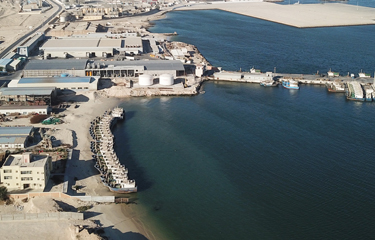China has clearly set out its ambition for increasing its fishing effort in African waters with the new designation of its third national-level distant-water processing hub.
The Fuzhou Lianjiang County International Fishery Base in Fujian Province encompasses the Mawei port, which has long been the base for the 600 distant water-vessels registered in the Fuzhou city limits and which have extensive operations in Africa.
The announcement by the Ministry of Agriculture puts the Fuzhou hub on a level with two other similar international fishery super hubs in Zhoushan and Qingdao. National status gives the port access to investments; The newly designated base will require private investment to cover its CNY 10.8 billion (USD 1.57 billion, EUR 1.41 billion) price-tag, but the money will be easier to source with the port’s new national status.
Among the firms set to benefit is Fuzhou Hong Dong Yuan Yang Fishing Co., which has been seeking to expand from it base in Mauritania into more southerly West African state of Guinea. Hong Dong’s Mauritanian base is China’s largest overseas fishery base, shipping 2,500 metric tons of seafood per week to European Union and U.S. customers, company CEO Chen Zhengjie told Fujian provincial TV in late 2018. He also said his company has 100 vessels in operation, most of them focused on tuna – and a further 60 under construction as part of the company’s effort to further expand in West Africa.
The Mawai port designation follows in the footsteps of a similar development in Fuzhou. Ground was broken in 2014 on the China Africa Fisheries Cooperation Project in Langqi Special Economic Zone, with local fisheries executives and officials joining with fisheries officials flown in from 15 African countries to mark the opening of the zone.
The park is operated by the China Africa Fisheries Union, a body run by Chinese fisheries companies with fleets in African waters. The 200-hectare project in Fuzhou, which is still under construction, is set to feature a harbour, cold-chain logistics and processing facilities, a conference center, and tourist facilities, as well as a training center for fishing crew.
The China Africa Fisheries Union (CAFU) is a media-shy body founded in Beijing in December 2012 “to develop African marine fisheries resources, [encourage] the development of China-Africa trade of fisheries and promote China-Africa marine fisheries cooperation and exchange platform for the purpose of international trade.” CAFU Chairman and Fuzhou native Chen Yonggui told the group’s annual conference in late 2018 that African seas are “rich” in marine resources.
“China needs to vigorously develop ocean-going fisheries to meet the basic needs of Chinese people,” Chen said, without referencing well-reported problems of overfishing off the West African coast.
Despite its international title, CAFU appears to be an entirely Chinese-run organization chaired by local long-distance fishing companies. A “letter of intent” signed at the ceremony between the Langqi economic zone and CAFU in 2014 was an all-Chinese affair. Other key figures in CAFU include the Lianjiang Farsea Fisheries Co. and the Hei Ying Asset Management Co., both based in Fujian Province.
CAFU has been key in the promotion of trade deals involving the transfer of Chinese investment and cooperation in return for access to African fishing grounds for Chinese fishing vessels. Offering insight into the thinking of African countries involved in the deals, officials from Zanzibar, Kenya, Nigeria, and Senegal officials backed the exchanges in a joint interview on Fujian TV in 2014. The delegate from the Nigerian Ministry of Agriculture said her country wanted Chinese government help to boost her nation’s mariculture sector and, in particular, its farming of tilapia.
Local officials in China, keen to promote their local economic development projects, have recently begun packaging port development projects, such as the one in Fuzhou, as part of the Belt and Road Initiative, a government plan to build out infrastructure at home and abroad to increase Chinese trade avenues. The initiative, also known as “One Belt, One Road,” envisions major Chinese investment into ports around the world as a means to increase trade.
In a recent interview, Zhang Xianliang, director of the Fisheries and Fishery Administration Bureau of the Ministry of Agriculture and Rural Affairs, signaled that the national government would back initiatives to further exploit African fisheries. China “will no longer seek to solely drive exports of seafood,” but will rather export aquaculture expertise and seek to enter into “cooperative relationships” with countries targeted by the Belt and Road Initiative, Zhang said.
So far, more than 150 countries have signed up to the BRI, according to the Chinese government, showing that China has found many willing partners eager to share in the economic bounty of China’s expansive trade policies – including many in Africa.
Photo courtesy of Fuzhou Hong Dong Yuan Yang Fishing Co.







